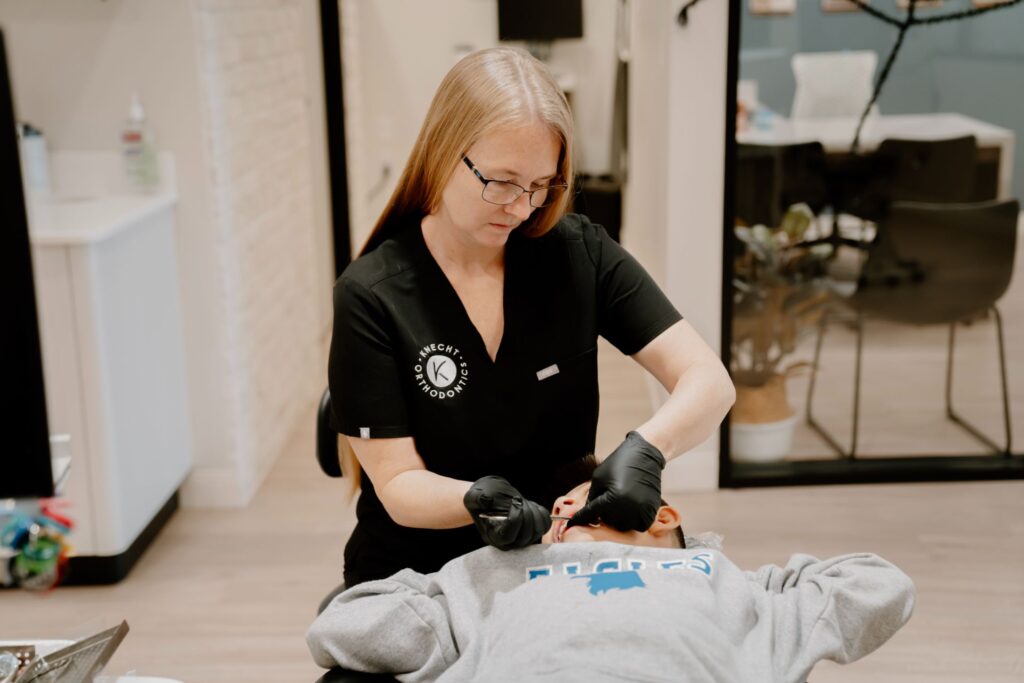Types of Braces
At Knecht Orthodontics, we’re committed to providing braces options that are effective, comfortable, and tailored to each patient’s unique needs. Using the KLOwen Custom Digital Bracket System, we offer both metal and ceramic braces, allowing patients to choose an orthodontic treatment that suits their lifestyle and aesthetic preferences. This advanced system ensures precise, efficient tooth movement, resulting in shorter treatment times and highly accurate outcomes.
Metal Braces
Traditional metal braces have evolved significantly, and our KLOwen metal braces are a modern, high-tech version of this trusted treatment. Made with durable stainless steel brackets, KLOwen metal braces are custom-designed for each tooth, ensuring precise alignment and enhanced comfort. These braces are popular for their reliability and effectiveness in treating a wide range of orthodontic issues, from crowding and spacing to more complex bite concerns.
Using the KLOwen system, we’re able to plan your treatment digitally and fabricate brackets that fit your unique smile perfectly. This customization allows for quicker tooth movement and a more comfortable experience, which can often result in a shorter overall treatment time compared to traditional braces. Plus, patients can personalize their looks by choosing colorful bands for added fun and self-expression.
Ceramic Braces
For patients looking for a more discreet option, we offer ceramic braces through the KLOwen system. These braces use clear or tooth-colored ceramic brackets that blend in with the natural color of your teeth, making them much less noticeable than metal braces. Ceramic braces are a great choice for adults and teens who want the benefits of traditional braces with a more aesthetic appearance.
Just like our metal braces, KLOwen ceramic braces are custom-fitted to each tooth using advanced digital technology, allowing for precise tooth movement and optimized comfort. With this customized approach, we’re able to achieve beautiful, aligned smiles while keeping treatment as comfortable and efficient as possible.
Why Choose the KLOwen Bracket System?
The KLOwen Custom Digital Bracket System represents a significant advancement in orthodontic care. By designing each bracket to fit a patient’s unique dental structure, KLOwen braces provide enhanced accuracy, comfort, and effectiveness. This level of customization reduces the need for adjustments, decreases treatment time, and creates a smoother overall experience.
At Knecht Orthodontics, we’re dedicated to offering orthodontic solutions that prioritize patient comfort and deliver outstanding results. Whether you choose metal or ceramic braces, the KLOwen system allows us to provide a treatment experience that is truly tailored to your needs, helping you achieve a confident, healthy smile in less time.
Explore your braces options with us and find out how Knecht Orthodontics can make your smile journey comfortable, efficient, and customized to you!

Braces For Kids
At Knecht Orthodontics, we believe early orthodontic treatment is essential for setting up a lifetime of healthy, confident smiles. Braces for kids allow us to address developing alignment issues, guiding teeth and jaw growth while children are still growing. With early treatment, we can help prevent more complex issues down the road.
Why Early Treatment Matters
Early treatment, or Phase One treatment, usually begins around ages seven to ten. This allows us to catch and address alignment concerns like crowding, overbites, and crossbites. By intervening early, we can guide jaw growth, create space for incoming permanent teeth, and improve alignment, often simplifying any future treatment.
Benefits of Braces for Kids
Starting braces early offers numerous advantages:
- Supports Jaw Development — Braces help guide proper jaw alignment, improving bite function.
- Creates Space for Permanent Teeth — Early treatment reduces crowding, allowing permanent teeth to come in more naturally.
- Boosts Confidence — A healthy, aligned smile can help kids feel more confident as they grow.
- Reduces Future Treatment Complexity — Addressing issues early often makes any future treatment simpler and shorter.
At Knecht Orthodontics, we make kids’ orthodontic care as comfortable and effective as possible. Our team is dedicated to creating a welcoming, kid-friendly environment where young patients feel supported. We ensure your child’s treatment is customized to their unique needs, setting the stage for a bright, beautiful smile they’ll enjoy for a lifetime.

Braces For Teens
At Knecht Orthodontics, we understand that a straight, healthy smile can be a huge confidence booster for teens. Our braces options are designed to provide effective, customized treatment while supporting an active lifestyle. With the KLOwen Custom Digital Bracket System, we offer both metal and ceramic braces that are tailored to fit each teen’s unique smile and alignment needs, making orthodontic treatment comfortable and efficient.
Why Teens Benefit from Braces
The teen years are a prime time for orthodontic treatment, as the jaws and teeth are still growing and can be easily guided into alignment. Braces not only help correct issues like crowding, spacing, and bite misalignment but also set the foundation for a lifetime of good oral health. Addressing these issues early can prevent dental problems down the road, making braces an important investment in a teen’s health and confidence.
Life with Braces: What Teens Can Expect
Adjusting to life with braces takes a bit of time, but teens quickly adapt to their new routines. With a few simple changes, they can keep up with their usual activities and enjoy a smooth treatment experience.
- Oral Hygiene — Brushing and flossing become especially important with braces. Teens will need to brush after meals and carefully floss to keep their teeth and braces clean, which helps prevent plaque buildup and staining.
- Diet Adjustments — To protect their braces, teens should avoid sticky or hard foods like gum, popcorn, and certain candies. But with plenty of braces-friendly foods available, they can still enjoy meals and snacks without worry.
- Sports and Activities — Braces won’t stop teens from participating in their favorite sports or activities. A mouthguard is recommended for contact sports to protect their braces and teeth. Otherwise, they can continue with most activities as usual.
- Handling Discomfort — As teeth begin to move, there may be some initial tenderness or tightness, especially after adjustments. This discomfort is usually mild and fades within a few days. Over-the-counter pain relief and orthodontic wax can help if needed.
At Knecht Orthodontics, we’re dedicated to making the braces experience positive and supportive for our teen patients. Our friendly team takes the time to explain each step, helping teens understand and feel comfortable with their treatment. With the advanced KLOwen system, we provide efficient, customized care that fits into a teen’s busy lifestyle, allowing them to focus on being themselves while achieving a healthier, more confident smile.
Whether you choose metal or ceramic braces, Knecht Orthodontics is here to guide your teen’s smile journey from start to finish, supporting their growth and confidence every step of the way.

Braces For Adults
Orthodontic treatment is not just for teens — many adults choose to improve their smile and oral health with braces. At Knecht Orthodontics, we understand that adults often seek discreet, efficient treatment options that fit into their busy lives. With the advanced KLOwen Custom Digital Bracket System, we offer both metal and ceramic braces that are customized to each patient’s unique needs, making adult orthodontic treatment effective, comfortable, and personalized.
Why Adults Choose Braces
Adults seek orthodontic treatment for various reasons, from improving dental alignment to enhancing their smile’s appearance. Braces can address issues such as crowding, spacing, overbite, and underbite, improving not only aesthetics but also oral health. Straightening teeth makes brushing and flossing easier, which reduces the risk of decay and gum disease, and properly aligned teeth distribute bite force evenly, lowering the risk of tooth wear and jaw discomfort.
Whether you’re addressing concerns that weren’t treated in childhood or are looking to improve your smile for personal or professional reasons, adult braces provide the opportunity to achieve a healthier, more aligned smile at any age.
Braces Options for Adults
Our practice uses the KLOwen Custom Digital Bracket System to create a treatment experience that’s tailored to adult patients. Each bracket is customized to fit the unique structure of your teeth, allowing for precise tooth movement with minimized discomfort. Available in both metal and ceramic options, KLOwen braces offer the choice between traditional braces or a more discreet ceramic alternative, which blends with the natural color of your teeth.
With the KLOwen system, we’re able to use digital planning to streamline treatment, often resulting in fewer adjustments and a shorter overall treatment time. This advanced approach makes it easier for adults to fit orthodontic treatment into their schedules without frequent in-office visits.
At Knecht Orthodontics, we’re dedicated to making orthodontic treatment convenient, effective, and tailored to adult patients’ needs. Our team takes a personalized approach to ensure each patient feels comfortable and supported at every stage of treatment. With the KLOwen Custom Bracket System, we’re able to provide a level of customization that reduces treatment time and enhances comfort, making adult braces a straightforward and rewarding experience.
With options like metal and ceramic braces, Knecht Orthodontics offers treatment that aligns with your lifestyle and smile goals, giving you the chance to enjoy a healthier, more confident smile — no matter your age. Reach out to our team to discuss how adult braces can make a lasting impact on your smile and overall health.



